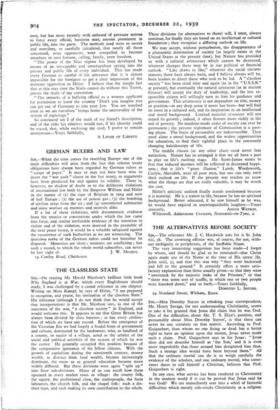THE CLASSLESS STATE
SIR,—On reading Mr. Harold Nicolson's brilliant little book Why England is at War, which every Englishman should study, I was challenged by a casual reference in one chapter. Writing on Mein Kamp(, he says of Hitler, " I am prepared to recognise, and praise, his institution of the classless State." His inference (although I do not think that he would accept that interpretation) is that Mr. Nicolson sees, as one of the outcomes of the war, " a classless society " in England, and would welcome this. It appears to me that Great Britain has always been divided by class barriers ; as has every civilisa tion of which we have any record. Before the emergence of the Victorian Era we had largely a feudal form of government and culture, dominated by the landowner, who, as landlord of a county, or squire of a village, acted as the arbiter of the social and political activities of the system of which he was the centre. He generally occupied this position because of the comparative ignorance of his fellow citizens. With the growth of capitalism during the nineteenth century, money wealth, as distinct from land wealth, became increasingly dominant, the more so as general education became more widely diffused. But these divisions were again " split up " into finer sub-divisions. Many of us can recall how these operated in every market town or village : the county folk, the squire, the professional class,• the tradespeople, the farm labourers, the church folk, and the chapel folk : each a dis- tinct type, and each making its own contribution to the whole. These divisions (or alternatives to them) will, I trust, always continue, for finally they are based on an intellectual or cultural foundation ; they recognise a differing outlook on life.
We may accept, without perturbation, the disappearance of a plutocratic domination of society (as largely exists in the United States at the present time), but Nature has provided us with a cultural aristocracy which cannot be destroyed, whatever changes there may be in our political or financial outlook. " Like draws to like," whatever the social circum- stances; there have always been, and I believe always will be, born leaders to direct those who seek to be led. A " classless society " has been tried time and again (as in the " U.S.S.R." at present), but eventually the natural aristocrat (as in ancient Greece) will accept the duty of leadership, and the less re- sponsible citizen will willingly turn to him for guidance and government. This aristocracy is not dependent on title, money or position—in any deep sense it never has been—but will find its roots in a cultured soil, and its inspiration in an intellectual and moral background. Limited material resources will not retard its growth ; indeed, it often flowers more richly in the soil of poverty. No machine-made order of society can ever be permanent ; the present nightmare of Communism is a pass- ing phase. The fruits of personality are indestructible. They need alone a moral background, and the widest opportunities for education, to find their rightful place in the constantly changing kaleidoscope of life.
The middle classes (as any other class) need never fear extinction. Nature has so arranged it that we all have a part to play on life's exciting stage. Mr. Scott-James seems to fear that reduced incomes will be reflected in decreased happi- ness ; that is life's " great illusion." Lamb, Wordsworth, Carlyle, Meredith, were all poor men, but one can only envy their outlook on life. If the present war teaches us anew what the things are that are really valuable, it may be worth the cost.
Hitler's atheistic outlook finally stands condemned because it is material. He is a traitor to life, because he has no spiritual background. Better educated, if he saw himself as he was, he would have expired in unextinguishable laughter.—Yours




































 Previous page
Previous page